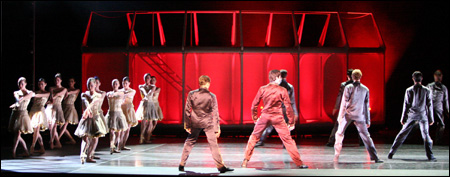When Yeats wrote, “How can we know the dancer from the dance?”, he probably wasn’t thinking of the effect different casts can have on the performance of a ballet. But as Carmen and Don José at the Wang Theatre last Friday, Kathleen Breen Combes and Yury Yanowsky gave Jorma Elo’s Carmen a makeover — it was hardly recognizable as the work Boston Ballet had world-premiered a week earlier. Where Karine Seneca had been a William Forsythe–like juggernaut, all straight edges except for her natural curves, Breen Combes was a George Balanchine–like enigma, all concavity and convexity as she tested herself and her body against first Don José and then Carlos Molina’s Escamillo, teasing and even kittenish in her Habanera. And for Roman Rykine’s pent-up homicidal rage, Yanowsky substituted regular-guy desire and doubt, looking less sure of himself with Lia Cirio’s Michaela than Rykine did but more commanding with Breen Combes’s Carmen. Tai Jimenez was a fluid, less kinetic Mercedes than Melissa Hough had been and wasn’t always in synch with her (uncredited) Frasquita, Dalay Parrondo (or vice versa); Mindaugas Bauzys’s Zuniga started out as a slighter version of Pavel Gurevich’s but developed complexities of repressed feeling.
|

A TALE OF TWO CARMENS: The world-premiere opening night isn’t always the whole story.
|
There were also changes in the staging. Carmen seemed to die a little less far stage left, so maybe she wasn’t out of view of the far-right side of the audience. Don José waits till Carmen, Mercedes, and Frasquita have cleared the stage before laying out Zuniga’s body; he’s still way upstage, but now he’s spotlit and there are no distractions. And after their second duet, Don José now remains below while Michaela climbs to the railing atop Walt Spangler’s bull ring/prison/ocean liner, which in this last guise recedes and carries her away as she crumples in anguish as he gestures farewell. Not everything is, or should be, lucid; Elo surely meant you to ask yourself why Escamillo indulges in eye-catching gymnastics while Carmen is sauntering into the wings, and why in turn Carmen, about to take her last turn with Don José, doesn’t notice that Escamillo has bounded off. On the other hand, Don José’s furious writing (erasing?) on the walls of the structure remained, after five viewings, a mystifying annoyance; it’s meant to signify something, but what? And why, if Escamillo is supposed to be a Formula One driver, does Carmen keep striking that bull pose?
Carmen as it premiered two Thursdays back, with the dancers Elo chose for his first cast, is a hard-nosed, avant-European ballet about sexual politics and sexual power set to a shadowy, skeletal score that Rodion Shchedrin has stripped of human resonance, a tree with no leaves. Concept and choreography seemed pre-ordained: Don José will leave Michaela; Carmen will leave Don José, and Escamillo wouldn’t have been far behind; Don José will murder Carmen. Characterization was solipsistic. The second-cast version was more like Bizet’s opera, with leaves fluttering everywhere in the emotional wind: Don José and Michaela, Don José and Carmen, Carmen and Escamillo, the dancers reacting to one another and looking as if they were making it up on the spot. Even the score, under both Mark Churchill and Jonathan McPhee, took on a 19th-century sense of tension and release, with a big climax for the Michaela/Carmen/Don José trio that wouldn’t have been out of place in a John Ford movie; yet the music retained its 20th-century identity. And the ballet evolved into art that was both modern and moving.